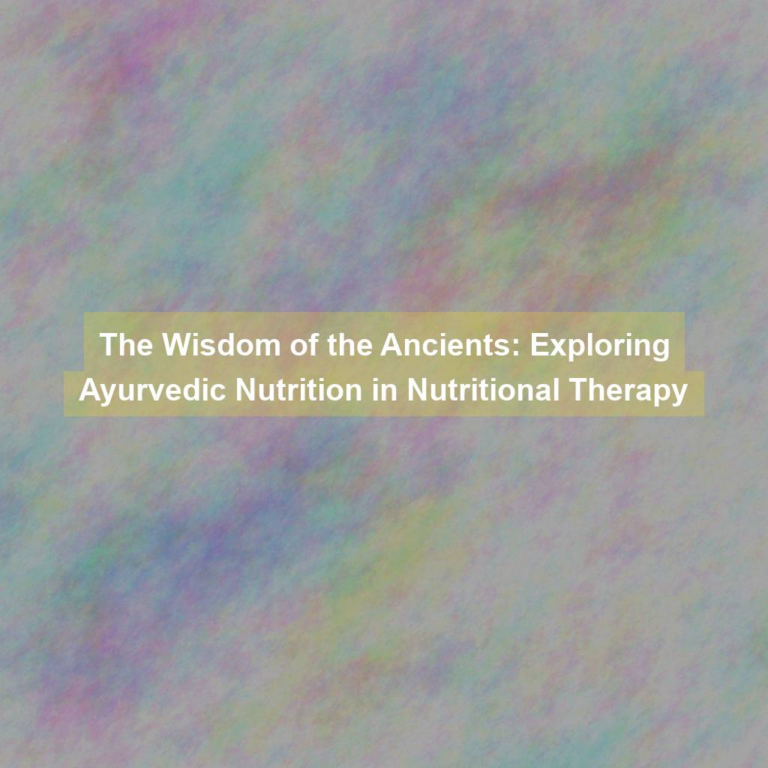Embarking on a journey to explore Ayurvedic dietary principles is akin to setting sail on a vast ocean, where the currents of health and wellness converge with the wisdom of ancient traditions.
As you navigate through the intricacies of Ayurvedic nourishment, you will uncover a tapestry of holistic principles that offer profound insights into the interconnectedness of food, body, and mind.
Understanding how these principles can harmonize within your own life may hold the key to unlocking a new level of vitality and well-being.
Understanding Ayurvedic Doshas
Understanding Ayurvedic Doshas is crucial for maintaining balance and harmony in your body and mind. According to Ayurveda, there are three doshas: Vata, Pitta, and Kapha. Each dosha represents a unique combination of the five elements ‘ ether, air, fire, water, and earth ‘ and plays a vital role in your overall well-being. Vata is associated with movement and is characterized by qualities of dryness, lightness, and cold. Pitta, on the other hand, embodies transformation and is linked to qualities of heat, sharpness, and intensity. Kapha, the third dosha, symbolizes stability and is marked by qualities of heaviness, coolness, and dampness.
When the doshas are in balance, you experience good health and vitality. However, an imbalance in these doshas can lead to various health issues. By understanding your dominant dosha and making lifestyle and dietary choices that support its balance, you can promote overall wellness. For instance, if you have a dominant Vata dosha, consuming warm and nourishing foods can help bring balance. Similarly, individuals with a dominant Pitta dosha may benefit from cooling and hydrating foods, while those with a dominant Kapha dosha may thrive on warm, light, and energizing foods.
Understanding your dosha can guide you in making informed choices to maintain equilibrium and promote holistic health.
The Six Tastes in Ayurveda
To maintain balance and harmony in your body and mind according to Ayurvedic principles, it’s important to understand the significance of the six tastes in your dietary choices. In Ayurveda, the six tastes are sweet, sour, salty, pungent, bitter, and astringent. Each taste has specific effects on the body and mind, and including all six tastes in your meals can help ensure a well-rounded and balanced diet.
The sweet taste, found in foods like fruits, grains, and dairy, promotes strength, nourishment, and satisfaction. Sour foods, such as citrus fruits and fermented foods, stimulate digestion and help cleanse the body. Salty taste, present in natural salts and certain vegetables, supports electrolyte balance and enhances taste in food. Pungent foods like chili peppers and garlic can aid in metabolism and circulation. Bitter taste, found in leafy greens and bitter melon, can help purify and detoxify the body. Lastly, astringent foods such as legumes and certain fruits have a drying effect and can promote stability and absorption.
Principles of Food Combining
Food combining is a dietary practice that emphasizes the optimal pairing of foods to support efficient digestion and nutrient absorption. The main principle is to eat fruits separately from other foods and not combine them with proteins or starches. This is because fruits are digested more quickly than other food groups. When mixed with slower-digesting foods, they can cause fermentation and digestive discomfort. In addition, Ayurveda suggests avoiding the combination of milk with sour fruits, as this can lead to digestive issues.
Another key principle is to avoid combining proteins with starches in the same meal. This is based on the idea that proteins require an acidic environment for digestion, while starches require an alkaline environment. When eaten together, the body may struggle to maintain the necessary pH balance for both types of food, leading to incomplete digestion and potential discomfort.
Furthermore, Ayurvedic principles recommend not combining incompatible tastes, such as sweet and sour, in the same meal. This is believed to disrupt the digestive process. By following these food combining principles, you can support your body’s digestive efficiency and overall well-being.
Nourishing Seasonal Eating
Considering the principles of food combining, embracing nourishing seasonal eating can further optimize your digestive health and overall well-being. In Ayurveda, the emphasis on seasonal eating is deeply rooted in the understanding that nature provides the most suitable foods for each season. As the seasons change, so do the qualities of the environment, and by consuming foods that are in harmony with these changes, you can support your body’s natural ability to maintain balance.
During the colder months, favoring warm, grounding foods such as root vegetables, hearty grains, and nourishing soups can help you stay grounded and maintain warmth in your body. In contrast, as the weather warms up, incorporating lighter, more astringent foods like leafy greens, berries, and legumes can help your body release any accumulated heaviness from the winter season.
Creating Balance With Ayurvedic Diet
Embracing the principles of Ayurvedic diet can help you cultivate balance and harmony within your body and mind. Ayurveda emphasizes the importance of balancing the three doshas: Vata, Pitta, and Kapha, to maintain optimal health.
Your unique constitution, or dosha, influences the foods that will help create balance for you. For example, if you have a predominance of Vata, incorporating warm, grounding foods like root vegetables and nourishing soups can help bring stability. If Pitta is your dominant dosha, favoring cooling foods such as sweet fruits and leafy greens can help pacify excess heat in the body. For Kapha, light, warming foods like spicy legumes and bitter greens can help counterbalance heaviness and stagnation.
By understanding your dosha and incorporating appropriate foods, you can create equilibrium within your body. Additionally, embracing mindful eating practices, such as savoring each bite and eating in a peaceful environment, can further support balance.
Ultimately, the Ayurvedic approach to diet is about nourishing your body in a way that fosters balance and well-being.
Conclusion
In conclusion, exploring Ayurvedic dietary principles can help you understand the importance of balancing the doshas, incorporating the six tastes, and practicing food combining for optimal health.
Nourishing seasonal eating and creating balance with an Ayurvedic diet can help you maintain overall well-being and vitality.
By incorporating these principles into your lifestyle, you can experience the benefits of Ayurveda and nourish your body, mind, and spirit.







